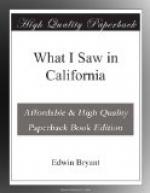La Ciudad de los Angeles is the largest town in California, containing between fifteen hundred and two thousand inhabitants. Its streets are laid out without any regard to regularity. The buildings are generally constructed of adobes one and two stories high, with flat roofs. The public buildings are a church, quartel, and government house. Some of the dwelling-houses are frames, and large. Few of them, interiorly or exteriorly, have any pretensions to architectural taste, finish, or convenience of plan and arrangement. The town is situated about 20 miles from the ocean, in a extensive undulating plain, bounded on the north by a ridge of elevated hills, on the east by high mountains whose summits are now covered with snow, on the west by the ocean, and stretching to the south and the south-east as far as the eye can reach. The Rio St. Gabriel flows near the town. This stream is skirted with numerous vineyards and gardens, inclosed by willow-hedges. The gardens produce a great variety of tropical fruits and plants. The yield of the vineyards is very abundant; and a large quantity of wines of a good quality and flavour, and aguardiente, are manufactured here. Some of the vineyards, I understand, contain as many as twenty thousand vines. The produce of the vine in California will, undoubtedly, in a short time form an important item, in its exports and commerce. The soil and climate, especially of the southern portion of the country, appear to be peculiarly adapted to the culture of the grape.
We found in Los Angeles an abundance of maize, wheat, and frijoles, showing that the surrounding country is highly productive of these important articles of subsistence. There are no mills, however, in this vicinity, the universal practice of Californian families being to grind their corn by hand; and consequently flour and bread are very scarce, and not to be obtained in any considerable quantities. The only garden vegetables which I saw while here were onions, potatoes, and chile colorado, or red pepper, which enters very largely into the cuisine of the country. I do not doubt, however, that every description of garden vegetables can be produced here, in perfection and abundance.
While I remained at Los Angeles, I boarded with two or three other officers at the house of a Mexican Californian, the late alcalde of the town, whose political functions had ceased. He was a thin, delicate, amiable, and very polite gentleman, treating us with much courtesy, for which we paid him, when his bill was presented, a very liberal compensation. In the morning we were served, on a common deal table, with a cup of coffee and a plate of tortillas. At eleven o’clock, a more substantial meal was provided, consisting of stewed beef, seasoned with chile colorado, a rib of roasted beef, and a plate of frijoles with tortillas, and a bottle of native wine. Our supper was a second edition of the eleven o’clock entertainment.




